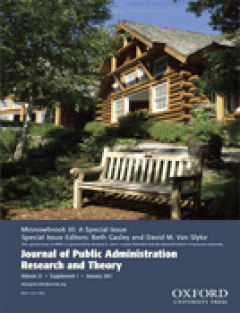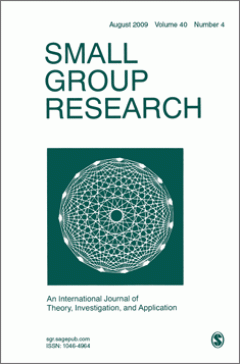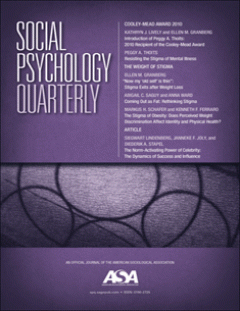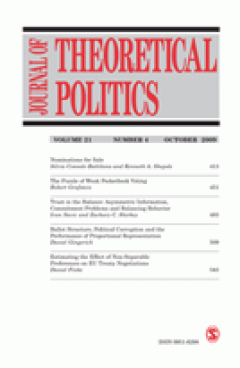Filter by

Toward Open Public Administration Scholarship
This essay focuses on the potential of information communication technologies to move the Public Administration (PA) scholarly community into a new information paradigm. We begin with a review of conventional approaches PA scholars use to communicate with each other, students, and practitioners. After illustrating advances in Web applications, we call for an “Open PA Scholarship” in which resea…
- Edition
- Vol. 21, Issue suppl 1, January 2011, Pp. i175-i19
- ISBN/ISSN
- 10531858
- Collation
- -
- Series Title
- Journal of Public Administration Research and Theory
- Call Number
- -

Time to Re-Group : A Typology and Nested Phase Model for Action Teams
Action teams are unique among group types in that their work is focused on time-constrained performance events that cannot be redone later. This aspect of their team temporality gives rise to an emphasis on simulation—a technique used by teams to replicate the taskwork, coordination, and communication of real-life events—and adaptation—in which teams use “time-outs” to give members a chance to …
- Edition
- Vol. 43 no. 1, February 2012,pp. 3-29
- ISBN/ISSN
- 10464964
- Collation
- -
- Series Title
- Small Group Research
- Call Number
- -

The Moderating Effect of Extraversion–Introversion Differences on Group Ide…
Previous research provides evidence that individual differences in the personality characteristic of extraversion/introversion can play a significant role in group idea generation. Cognitive stimulation has also been shown to have a significant, though inconsistent, influence on idea generation in computer-mediated groups. We conducted two controlled experiments using a web-based group simulato…
- Edition
- Vol. 43 no. 1, February 2012,pp. 30-49
- ISBN/ISSN
- 10464964
- Collation
- -
- Series Title
- Small Group Research
- Call Number
- -

The Influence of Emergent Expertise on Group Decision Processes
This study examines how group decision processes are affected by the perceived emergent expertise of a group member in situations where a correct solution is not readily verifiable. Using a moderately judgmental task, as opposed to an intellective task, the results of our experiment suggest that when group members are aware of performance feedback: (a) they gradually form a perception about the…
- Edition
- Vol. 43 no. 1, February 2012,pp. 50-74
- ISBN/ISSN
- 10464964
- Collation
- -
- Series Title
- Small Group Research
- Call Number
- -

Team Emotional Intelligence and Performance : Interactive Dynamics between Le…
Despite increasing attention to emotional intelligence (EI) in the workplace, few studies have investigated EI at the group level. In this study, we propose that average member EI indirectly affects team performance by shaping emergent team dynamics. The results based on 91 teams show that both average member EI and leader EI are positively associated with intrateam trust, which in turn positiv…
- Edition
- Vol. 43 no. 1, February 2012,pp. 75-104
- ISBN/ISSN
- 10464964
- Collation
- -
- Series Title
- Small Group Research
- Call Number
- -

Self-Interest Masquerading as Ingroup Beneficence : Altruistic Rationalizatio…
An altruistic rationalization explanation of the interindividual–intergroup discontinuity effect proposes that intergroup interactions are more competitive than interactions between individuals because group membership creates an opportunity to rationalize selfishly motivated competitiveness as being enacted for the ingroup’s sake. To test this explanation, we compared participants whose decisi…
- Edition
- Vol. 43 no. 1, February 2012,pp. 105-123
- ISBN/ISSN
- 10464964
- Collation
- -
- Series Title
- Small Group Research
- Call Number
- -

The Evolution, Contributions, and Prospects of the Youth Development Study : …
Grounded in social structure and personality, life course, and status attainment perspectives of social psychology, the Youth Development Study (YDS) has followed a cohort of teenagers from the beginning of high school through their mid-thirties. Evidence for the effective exercise of agency derives from diverse adolescent work patterns leading to outcomes that are consistent with youth’s earli…
- Edition
- Vol. 75 no. 1, March 2012,pp. 5-27
- ISBN/ISSN
- 01902725
- Collation
- -
- Series Title
- Social Psychology Quarterly
- Call Number
- -

Secondary Transfer Effects of Intergroup Contact : A Cross-National Compariso…
This article examines so-called secondary transfer effects of intergroup contact, a phenomenon whereby positive intergroup contact experiences can influence attitudes not only toward encountered (primary) outgroups but also toward other (secondary) outgroups that were not initially involved in the intergroup encounter. The current study relies on a unique cross-sectional sample of the general p…
- Edition
- Vol. 75 no. 1, March 2012,pp. 28-51
- ISBN/ISSN
- 01902725
- Collation
- -
- Series Title
- Social Psychology Quarterly
- Call Number
- -

The Interactional Organization of Self-praise : Epistemics, Preference Organi…
This article contributes to a social psychological understanding of identity by identifying some features of the interactional organization of self-praise. Early conversation analytic work on the epistemics of self-assessment and constraints against self-praise has shown that praising oneself is an interactionally delicate matter that may leave one vulnerable to “unfavorable character assessmen…
- Edition
- Vol. 75 no. 1, March 2012,pp. 52-79
- ISBN/ISSN
- 01902725
- Collation
- -
- Series Title
- Social Psychology Quarterly
- Call Number
- -

The Impact of Education on Intergroup Attitudes : A Multiracial Analysis
How does education affect racial attitudes? Past studies focus almost exclusively on whites’ attitudes toward blacks, neglecting important minority populations. This study extends previous research by analyzing the effects of education on beliefs about racial stereotypes, discrimination, and affirmative action policies among whites, Asians, Hispanics, and blacks. Results indicate that whites, H…
- Edition
- Vol. 75 no. 1, March 2012 ,pp. 80-106
- ISBN/ISSN
- 01902725
- Collation
- -
- Series Title
- Social Psychology Quarterly
- Call Number
- -

Who selects the party leader
We study the degree of formal influence that rank-and-file members have on the selection of party leaders in the five English-speaking Westminster countries: Australia, Canada, Ireland, New Zealand and the United Kingdom. We find that in recent years there has been a general, though not universal, trend towards granting party members greater influence in the choice of their leader. We observe t…
- Edition
- Vol. 18 no. 2, March 2012,pp. 127-150
- ISBN/ISSN
- 13540688
- Collation
- -
- Series Title
- Party Politics
- Call Number
- -

The homogeneity of West European party families : The radical right in compar…
Common concepts for the classification of parties into families (origins, transnational links, ideology, name) suggest that the radical right should be less homogeneous than most other party families in Western Europe: their comparatively diverse origins, disputed ideological core features, as well as the lack of stable transnational cooperation and the absence of an agreed-upon label support t…
- Edition
- Vol. 18 no. 2, March 2012 ,pp. 151-171
- ISBN/ISSN
- 13540688
- Collation
- -
- Series Title
- Party Politics
- Call Number
- -

Party media agenda-setting : How parties influence election news coverage
Political parties have substantial influence on which issues the news media cover during election campaigns, while the media have limited influence on party agendas. However, we know little about why some parties are more successful than others in passing the media’s gates and being covered on sponsored issues. On the basis of content analyses of election news coverage (812 news stories) and pr…
- Edition
- Vol. 18 no. 2, March 2012,pp. 173-191
- ISBN/ISSN
- 13540688
- Collation
- -
- Series Title
- Party Politics
- Call Number
- -

Party and gender in Western Europe revisited : A fuzzy-set qualitative compar…
Scholars of women’s parliamentary presence have suggested that the proportion of women parliamentarians rests on the interaction between intra-party and party external conditions, and that these can be discussed in terms of necessity and sufficiency. Still, the field lacks systematic cross-case assessments of such relationships. This research takes an explorative approach to necessity, sufficie…
- Edition
- Vol. 18 no. 2, March 2012, pp. 193-214
- ISBN/ISSN
- 13540688
- Collation
- -
- Series Title
- Party Politics
- Call Number
- -

When citizens go against elite directions : Partisan cues and contrast effect…
While much research has investigated the persuasive effects of partisan cues on citizens’ evaluations of political messages, our knowledge regarding failed persuasion is limited. It remains particularly unclear whether failed elite attempts at persuasion simply leave citizens’ attitudes unchanged or whether such attempts at persuading one segment of the electorate can actually lead to a loss of…
- Edition
- Vol. 18 no. 2, March 2012,pp. 215-233
- ISBN/ISSN
- 13540688
- Collation
- -
- Series Title
- Party Politics
- Call Number
- -

Party system types and party system institutionalization : Comparing new demo…
This article is an overview of the types and level of institutionalization of party systems in seven young democracies in East and Southeast Asia. By applying Alan Siaroff’s typology of party systems, the analysis demonstrates that the party systems in Asia do not converge on a single format. The party systems under consideration also differ in the level of institutionalization. Party systems i…
- Edition
- Vol. 18 no. 2, March 2012,pp. 235-265
- ISBN/ISSN
- 13540688
- Collation
- -
- Series Title
- Party Politics
- Call Number
- -

A backroom without the smoke? Superdelegates and the 2008 Democratic nominati…
This article is an examination of the candidate preferences of 2008 superdelegates and of their role in determining the eventual Democratic nominee. Multivariate analysis suggests that female superdelegates were less likely to support Obama than were men; African-Americans, in contrast, were more likely to support his candidacy. A higher percentage of the popular vote received by Obama in the p…
- Edition
- Vol. 18 no. 2, March 2012,pp. 267-283
- ISBN/ISSN
- 13540688
- Collation
- -
- Series Title
- Party Politics
- Call Number
- -

Bargaining and the effectiveness of international criminal regimes
International institutions lack the independent ability to punish non-compliance, but states sustain cooperation because they can target one another for punishment. In contrast, international criminal courts and tribunals (ICTs) can enforce rulings once suspects are in custody, but they lack the independent power of capture, leaving them unable to punish alleged criminals and therefore deter cr…
- Edition
- Vol. 24 no. 2, April 2012,pp. 149-171
- ISBN/ISSN
- 09516298
- Collation
- -
- Series Title
- Journal of Theoretical Politics
- Call Number
- -

Demystifying trust : Experimental evidence from Cambodia and Thailand
We report the results of a trust survey and public goods experiment conducted with high school students in rural Thailand and Cambodia that together help clarify the dynamics at work in sustaining economic cooperation within these two third-world communities. We find that standard survey measures of trust employed by the World Values Survey, which form the basis of most macro-empirical investig…
- Edition
- Vol. 24 no. 2, April 2012, pp. 172-209
- ISBN/ISSN
- 09516298
- Collation
- -
- Series Title
- Journal of Theoretical Politics
- Call Number
- -

Dictatorship in a single export crop economy
We provide an analysis of a power-maximising model for dictatorial behaviour. In the model, the dictator’s revenues depend on the exports of a single crop. Using export earnings the dictator buys loyalty from the producers of the export crop by setting the domestic producer price. Revenues resulting from the difference between the international and the domestic price of the crop are used to fin…
- Edition
- Vol. 24 no. 2, April 2012,pp.210-234
- ISBN/ISSN
- 09516298
- Collation
- -
- Series Title
- Journal of Theoretical Politics
- Call Number
- -
 Computer Science, Information & General Works
Computer Science, Information & General Works  Philosophy & Psychology
Philosophy & Psychology  Religion
Religion  Social Sciences
Social Sciences  Language
Language  Pure Science
Pure Science  Applied Sciences
Applied Sciences  Art & Recreation
Art & Recreation  Literature
Literature  History & Geography
History & Geography